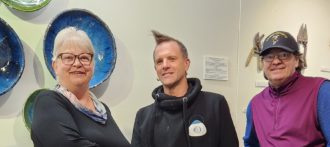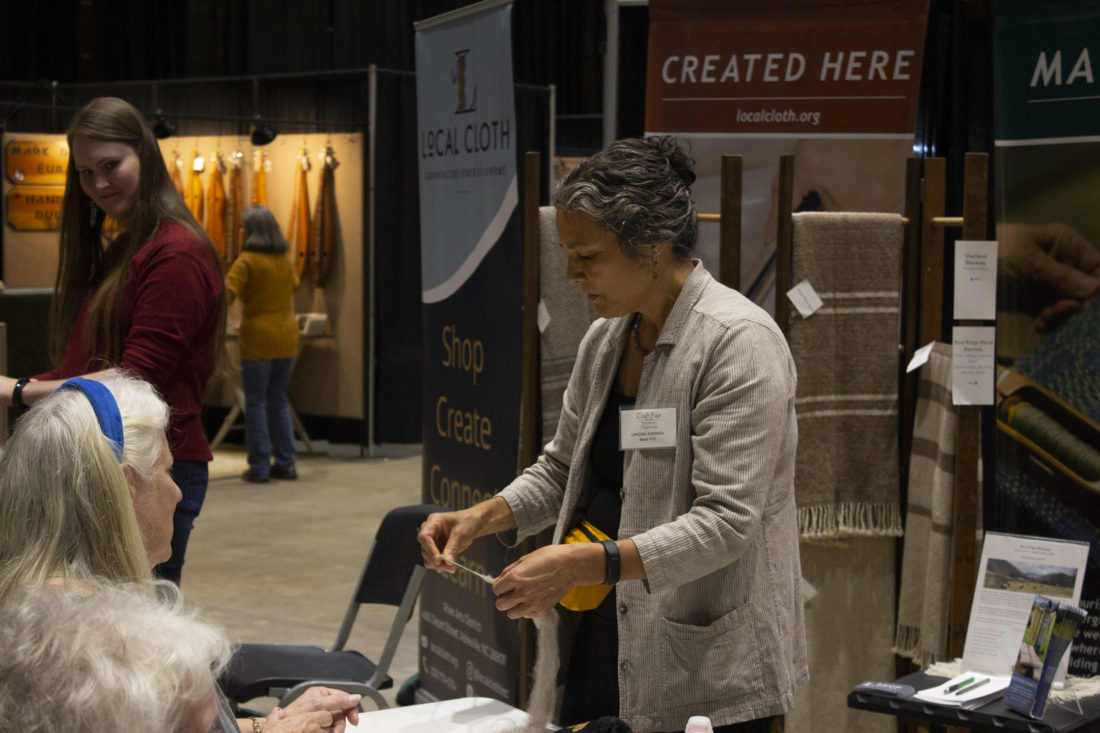Starting out and starting fresh aren’t that different, especially when it comes to arts nonprofits — or nonprofits in general. Whichever position a group finds itself in, a similar level of planning, community outreach and tempering expectations is necessary to achieve its goals. Otherwise, it’s easy to become overwhelmed and overmatched, resulting in the disappearance of an important local service.
Xpress spoke with leaders from the new nonprofit All Together Art, as well as the established Local Cloth. While the latter organization has benefited from greater visibility on account of its decadelong run, it turns out both nonprofits have more in common than people may think.
To serve, with love
Forty years gone, Brandon Daughtry Slocum returned to her native Blue Ridge Mountains in 2021. And upon her homecoming, she discovered her latest calling thanks to a pottery course at Odyssey Clayworks.
While enrolled, Slocum befriended the organization’s director, Gabriel Kline. As the two got to know each other better, Slocum shared her experiences as a Humanist Society chaplain and a former military spouse. These stories soon led Kline to invite Slocum to join Odyssey’s therapeutic pottery program for military veterans.
“I took part in the class, and it was just incredible,” Slocum remembers.
But she quickly discovered that funding for the program had been cut. “Gabriel was trying to do it on his own,” she says.
No stranger to the nonprofit sector (in 2003, while living in Knoxville, Tenn., Slocum co-founded Shakespeare in the Square), she got to work and launched All Together Art earlier this year.
“It was just an idea in July, and now we have our 501(c)(3), and our first program is up and running,” says Slocum, who also serves as the group’s board chair.
Thanks to a generous donation from an individual donor, the new nonprofit has been able to fund a free, eight-week ceramics course for veterans. The series began on Oct. 16 and is led by local artists Sara Ballek and Paige Janeri.
“We want to make sure that we’re paying our teachers and instructors and partners a living, fair market wage for their work,” says Slocum. “We’re not asking them to work for free, and we want to open up this type of experience to everyone in our community.”
To continue to accomplish these goals, All Together Art plans to partner with other local arts organizations. In doing so, it hopes to grow its offerings while still maintaining a strong focus on pottery. Events already planned for 2023 include the Great Pottery Throwdown fundraiser on Feb. 25, and an eight-week course in spring for LGBTQIA youths, ages 13-16, whom Slocum notes are at a particularly high risk for suicide.
According to a 2020 study by the national Centers for Disease Control and Prevention, suicide is the second-leading cause of death among young people ages 10-14. And The Trevor project — the world’s largest suicide prevention and mental health organization for young lesbian, gay, bisexual, transgender, queer and questioning people — reports that LGBTQ youths are four times more likely to attempt suicide than their peers.
“We’re losing way too many of these kids,” Slocum says. “The numbers are staggering, so that’s what’s motivating us to make that our next project.”
Though Slocum notes it’s always a challenge to launch and sustain a nonprofit, now is particularly tough with a recession looming and economic apprehension leading to tighter pockets. Fortunately, her grassroots group isn’t looking for “huge donations from the superrich,” but in $5-$10 increments as well as through grant writing and, eventually, corporate sponsorships.

With only five board members, no overhead and funneling “every dime” raised into programming, Slocum feels that All Together Art is built to succeed. By following that modest blueprint, she believes that others interested in starting arts nonprofits can likewise accomplish their dreams. In her experience, keeping operations small at first, getting programs up and running before building an infrastructure and making connections in the community will gradually attract donors and volunteers.
“I think nonprofits are what defines a community,” Slocum says. “If you want to know what kind of community you’re in, look to the nonprofit work going on and that will tell you where you are. And Asheville, of course, is just a remarkable community.”
To learn more, visit avl.mx/c5d.
Location, location, location
Among the nonprofits that have helped shape Asheville’s identity over the years is Local Cloth, which launched in 2012 with the goal of showing area residents that they could have and wear handmade garments made by local artists. The organization was founded by textile artist Judi Jetson as a way to help carry on the efforts started by Western North Carolina crafts nonprofit HandMade in America, which closed in 2015 and where Jetson worked after moving from Florida to Asheville in 2010.
“We’re not exactly a new nonprofit,” she says. “But we moved to a new location, so we sort of became public — would be a good way to say it — last year.”
Before 2021, Local Cloth ran its operations and held its classes in a 900-square-foot space in the back of The Refinery arts incubator on Coxe Avenue. Though rent was reasonable, Jetson notes that being in the beer district instead of the arts district had its drawbacks, as did the limitations of the space itself.
“It wasn’t a place where people actually could see us,” she says. “We didn’t have a storefront. It was just a place where we could go mess around and make things.”
In April 2021, Jetson signed a lease on the ground floor of 408 Depot St., reopening Local Cloth that June. The space, she notes, is just over three times as large as the nonprofit’s previous location.
“We now have about 35 different fiber artists and farmers that raise fiber animals who are vendors in the shop, and our class numbers and attendance have grown,” Jetson says. “It’s a great location and it’s made us visible in the community.”
One area organization that’s taken notice is The Community Foundation of Western North Carolina, which approached Local Cloth about helping make more opportunities for farmers. Through a Natural and Cultural Resources Grant, the Blue Ridge Blankets project was funded to make blankets out of local fiber and colored with natural dyes. The first sample batch was finished in September and was displayed at Local Cloth’s shop, the Craft Fair of the Southern Highlands and the Southeastern Animal Fiber Fair.
Such funding, however, has been rare. Jetson notes that Local Cloth’s approach has been to focus on earned income as a revenue source rather than grants or contracts, which she says are too unpredictable to rely on, especially in the current climate. Furthermore, she adds, the Asheville community is “notoriously reluctant to fund new nonprofits.” In turn, she stresses patience.
“It takes a while to get established,” she says. “You have to really start small — not that I’m against big dreams. Big dreams are great, but you have to be comfortable starting small and doing things where you can generate enough revenue through ticket sales or classroom registration or memberships to begin to grow.”
Jetson also highlights the importance of having a business plan, pointing to nonprofits and small businesses having a comparable failure rate. For-profit businesses, she notes, have more local support organizations than nonprofits do, which makes Mountain BizWorks and the Service Corps of Retired Executives all the more valuable.
“SCORE has people who’ve retired here who have had experience either in business or nonprofits that they offer for free,” she says. “I’ve got a team of people with expertise in retail and marketing and in business management that are all advising us about things we could do to have our nonprofit stay on a steady growth path.”
With the new location running smoothly, Jetson is currently working to expand community outreach and cultivate a more diverse group of customers. In the coming year, she plans to engage the residents of surrounding neighborhoods, either at Local Cloth’s building or meeting those neighbors where they live. And over the next couple of years, her goal is to transition from an all-volunteer-led organization to one with paid staff positions.
“We’ve had a lot of success with an all-volunteer leadership group and people working in the shop and helping with workshops,” Jetson says. “But when you’re grassroots, people move on, their interests change, they get burned out — so we need to figure that out.”
To learn more, visit avl.mx/c5e.



Before you comment
The comments section is here to provide a platform for civil dialogue on the issues we face together as a local community. Xpress is committed to offering this platform for all voices, but when the tone of the discussion gets nasty or strays off topic, we believe many people choose not to participate. Xpress editors are determined to moderate comments to ensure a constructive interchange is maintained. All comments judged not to be in keeping with the spirit of civil discourse will be removed and repeat violators will be banned. See here for our terms of service. Thank you for being part of this effort to promote respectful discussion.